- Home
- John Cheever
Oh What a Paradise It Seems Page 6
Oh What a Paradise It Seems Read online
Page 6
“What in hell was that?” said Sears.
“It was the man who’s going to drive me to the airport.”
She went into the hallway, where he heard her open a closet.
“Where are you going?” Sears demanded. “You haven’t told me you were going anywhere and you certainly haven’t behaved as if you were taking a plane.”
“You might have noticed that my suitcase is in the hallway. You always notice that sort of thing.”
“I’ve noticed that your hallway is always full of suitcases,” Sears shouted. “I’ve been stumbling over the damned things for months.”
“Well, would you like to help me to the elevator with my suitcase,” she asked, “or shall I ring for Eduardo?”
She stood in the doorway wearing a hat and a coat and pulling on her gloves. He felt himself approaching those bewildering spiritual mountains where he doubted the reality of his person and his world. He went into the hallway and picked up her bag. “Where in hell are you going?” he asked.
“I’m going back to Des Moines to see my daughter,” she said. “I must have told you but you’ve forgotten.” Eduardo, rather more like a custodial relative than a lover, regarded the suitcase, Sears’s face white with rage and Renée’s airs of a traveler with great composure. Sears’s only commitment was to wait for her on the sidewalk until the car had its door opened and to accept her goodbye kiss. “You don’t know the first thing about women,” she said. He did not look back in the lobby at Eduardo and went to a movie. To scorn one’s world is despicable, he thought, and he would merely observe that the theatre he chose was nearly empty, that the film was about werewolves and that a man in the row ahead of him had brought his dinner to the theatre and ate it during the film. When the movie ended Sears returned to Renée’s house and found Eduardo in the lobby. He was pleased to see him as he would have been pleased to see a dear friend. “We’ve got to find something else we can do together,” he said. “Do you like to fish? Would you like to go fishing?”
“Sure I’d like to go fishing,” said Eduardo. “I’ve got some time coming, but I’ll have to check with the union about a replacement.”
“I know of a good bass pond upstate,” said Sears. “There used to be a decent inn there. Do you have any tackle?”
“I think I have a couple of bait-casting rods,” said Eduardo. “I’ll have to look. My sons may have taken them.”
“What do your sons do?” asked Sears.
“The youngest is a senior at Rutgers,” said Eduardo. “The oldest plays jazz piano in a place in Aspen. That’s in Colorado.”
“Well, goodnight,” said Sears. “We’ll work out something.”
“Goodnight.”
Ten days later in a rented car Sears and Eduardo headed north for a pond near the Canadian wilderness that Sears recalled having fished ten years ago, although his memory was often mistaken and it might have been twenty years in the past or even longer. They left for the north on a rainy morning and this corresponded exactly to Sears’s sense of the fitness of things. Eduardo drove until they stopped somewhere for lunch and Sears then said, “I’ll drive.” Eduardo tossed him the keys, and as soon as he started north in the rain Eduardo fell asleep. Sears was terribly happy.
He drove north on route 774, which had, like any main thoroughfare, changed greatly in the last ten years. Sears was not disenchanted but he did observe what there was to be seen. They traveled through what had been a neighborhood of small dairy farms, where the acre and half-acre fields had been divided by stone walls and light stands of timber. There were a few churches and farmhouses from the nineteenth century and even earlier that were completely unpretentious but that, in their charm and inventiveness, seemed outstandingly patrician. Seven seventy-four was now a length in that highway of merchandising that reaches across the continent. It would be absurd to regret the obsolescence of the small dairy farm, but the ruined villages were for Sears a melancholy spectacle, as if a truly adventurous people had made a wrong turning and stumbled into a gypsy culture. Here were the most fleeting commitments and the most massive household gods. Beside a porn drive-in movie were two furniture stores whose items needed the strength of two or three men to be moved. He thought it a landscape, a people—and he counted himself among them—who had lost the sense of a harvest.
While he drove he thought self-righteously of what he had done to improve the scene; what he had done for Beasley’s Pond. He had employed the environmentalist—Chisholm—and paid a laboratory at Cornell to specify the toxicity in the water. The reports were not completed, but there was to be a hearing in the town of Janice in the coming week. Chisholm spoke of the people who were destroying the pond as a huge and powerful criminal organization, who were bribing small municipalities and polluting water supplies to profit from the high cost of fill sites. Sears was not completely persuaded. Chisholm was one of those men whose worthwhileness, it seemed to Sears, was more of a genetic trait than a persuasion. One found them all over the world. The size of Chisholm’s teeth, the thickness of his glasses, his stoop and the spring with which he walked all marked him, Sears thought, as a single-minded reformer. His marriage, Sears guessed, would have been unsuccessful and his children would have difficulty finding themselves. Sears was not far from wrong. Seven seventy-four seemed an extension of the destruction of Beasley’s Pond.
It was late when they reached the inn. Sears was disappointed but not surprised to find his inn flanked by two fried-food shops. The inn had changed ownership many, many times since he had been there. They drank a lot at the bar but whenever they mentioned fishing the barman changed the subject. The kitchen was closed and they ate sandwiches for supper. In their room they watched a show on television and went together to bed. Sears woke up. He had no idea of the hour but it was that hour when one is given the illusion of insight. He went to the window. The fried-food places were closed but the window was open and the smell of fried food filled the room.
It was the smell of fried food that seemed to fill his consciousness. He thought, but only for a moment, of fried food as a new aberration like the strip with its cut-rate outlets and drive-in peep shows. He hastily amended this random thought with the knowledge that fried food had been one of the first things to be smelled on the planet. After the discovery of love, the importance of hunting and the constancy of the solar system came the smell of frying food. Even now, at the end of harvest in the most inaccessible of the Carpathians the shepherds come down from the mountains with their herds in the autumn to hear gypsy fiddlers and a snareless drum and smell sausages rotating over charcoal. It was barbarous—it disclaimed authority—and its magic was malnutrition, acne and grossness. It was indigestible and highly odorous and would be, if you were unlucky, the last thing you smelled on your way to the executioner’s block. And it was portable. You had to be able to eat it as you sat in a saddle or rode on a Ferris wheel or walked the midways and alleys of some country fair. You had to be able to eat it with your fingers, picking it from a cornucopia of leaves or bark or human skin while you paddled your war canoe or marched into battle. They were eating fried food when they made the first human sacrifice. Eggplant was being fried in the Colosseum when they broke the philosopher on the wheel and fed the saints to the lions. They were eating fried food when they hung the witches, quartered the pretender and crucified the thieves. Public executions were our first celebrations and this was holiday food. It was also the food for lovers, gamblers, travelers and nomads. By celebrating and extolling fried food, all the great highways of the world kept alive our early memories of itinerant hunters and fishermen when we possessed no history and very little vision. It was the food for spiritual vagrants.
Eduardo was sleeping noisily when Sears returned to bed. Sears had been told that such lovers were always thieves, liars, felons, and sometimes murderers, but he thought he had never known anyone so honest. He felt then a surge of lewdness and with this some revelation that these caverns of his nature would never enjoy coherenc
e. What he felt for Eduardo seemed more like nostalgia than the adventurousness of traditional love but it felt no less powerful. He saw then that if he was truly seeking purity he would never find it in himself.
In the morning they woke quite happily. Eduardo washed his hair with a shampoo that, Sears noticed, was advertised to make his head a glory of lustrous radiance. It reminded Sears of the happy and robust vanity of that time of life and—with no ruefulness at all—of the vast difference in their ages. How long it had been since Sears had ducked his head into a basin of water and combed his hair with the hope of appearing attractive.
After breakfast they rented an outboard. Fishing water was for Sears a creation with which he enjoyed a powerful rapport. He was enjoying this while tying a leader when the man who had rented them the boat came over and said: “I can’t let you men go out without telling you that there hasn’t been a fish here for about ten years. The last time the water was tested—that was three years ago, I think—it was a little more acid than commercial vinegar.”
“Are there any other ponds around here?” Sears asked.
“Yeah, there’re about a hundred ponds around here,” the stranger said, “maybe two hundred, but they’re all just as acid as this. Of course there’s nothing to stop you from trying. The fish may be coming back.”
They went out anyhow on the disqualified water and cast for an hour or so. Eduardo, Sears noticed, got his line out with commendable grace and expertise. When they brought the boat in Sears asked his friend what he was going to do with the rest of his ten days’ vacation. “I’ll take my wife to Key West,” he said. “The union has package tours that you don’t have to book in advance. I took her down the year before last and she loved it.” They drove back down the strip again and it rained again. The younger man’s company helped Sears to understand better the barbarity and nomadism of 774. They parted at Sears’s apartment. “I’ll see you when Renée gets back from Des Moines,” said Sears. “Get a great tan.”
9
AFTER the fracas in the supermarket Henry saw that Betsy needed a change. He got the day off and they decided to go to Chelmsford Beach. It wouldn’t be as crowded as it always was on the weekends and they didn’t much enjoy it with a big crowd. Betsy made a picnic, with lemonade for herself and beer for Henry, and they took off at about ten in the morning with little Randy and Baby Binxie in the carrier. It was a nice summer’s day. They made the trip in less than two hours and they both enjoyed reaching the beach on a weekday when half the parking lots were closed and privacy on the beach was just something you walked into, which contrasted with their memories of the weekends when privacy was something you had to look for like a needle in a haystack. They found a nice place and put a parasol up over Binxie with his bottle. She and Henry had a nice swim and then she went up and lay on the sand and Henry gave Randy a swimming lesson. Henry kept shouting: “That’s the way, that’s the way, that’s the way to do it!” He seemed very happy and excited. A little way down the beach was a group of very old people. They were so old that if they went swimming they would sink. They sat on the sand wearing all their clothes, including vests and hats, and one of the women kept saying, “Oh what have we done to deserve such a beautiful day!” Betsy didn’t know what she was talking about.
Then Randy came running up and said that he had learned to swim and so she went down to the edge of the water and watched him demonstrate his stroke. She was very happy to see how pleased both he and his father were and she did not mention the fact that the buoyancy of salt water made it easier to swim in the ocean than to swim in the pools where she had done most of her swimming. Then they ate their sandwiches and Henry drank his beer and kissed Betsy and felt very amorous, but there wasn’t any place and they knew that when they made love or even thought about it it made little Randy feel lonely and left out and they didn’t want to spoil his day at the beach and she understood when Henry stopped kissing her. She had thought to pack a softball and Randy and Henry were happy to throw this back and forth, and she was happy to lie on the beach and hear the waves and smell the salt water.
Her people were not fishermen or sailors and she had nothing at all to do with the sea so far as she knew, but the brine and the blue sky and the sand all seemed most natural to her as if this were her home, although she could not imagine what it must be like to live near the sea with its winter storms and tempests. She had never in her life seen the ocean but on a summer’s day. She went swimming again and again. Then the old people left and the shadows began to fall toward the sea. They packed up their own things. They were the last people on the beach and Baby Binxie was sleeping. While she gathered up the towels and the sandwich papers and Binxie’s diapers she remembered watching on TV when an astronaut went into space. After the countdown the camera had shown all the people along the beach packing up their sandwich baskets and their towels and their folding furniture and going back to the parking lot, and she remembered that this had moved her more deeply than the thought of a man walking around on the moon. Almost everybody else on the beach had gone home early, and it seemed to her that they had gone because they had received some urgent message to leave and that the beach was their home and that on leaving the beach they would be like the evacuees of war or much more recently like those people who lived near toxic dumps and who have to travel for years, perhaps for a lifetime, seeking a new home.
“That was a nice day at the beach, darling,” she said to Henry when they got to the parking lot and she kissed him. “I’ve always liked to spend a day at the beach and that was a very nice one.” He kissed her and said, “I thought it was a very nice day too, but I’m going to ask you to drive until we get to route 224 if you don’t mind. I’m sunburned and my eyes are strained and I’d like to rest before I hit the heavy traffic on route 224.” “I know what you mean,” she said, “but I’d love to drive.” And so he got in the back seat with Randy and they put Binxie’s carrier in the front seat and off they went.
“That sun made me feel poleaxed,” Henry said and that was the last she heard from him. Then little Randy fell asleep and Binxie was already gone and she found herself alone in the car like the captain of a ship but a pleasant feeling of aloneness. She knew what Henry meant feeling poleaxed, but she had the strength to drive to 224 in a car with three sleeping and beloved men. Two twenty-four was a convergence of six- and eight-lane highways that made her think with longing of the simplicity of their day on the beach, when there was nothing more difficult to comprehend than blue sky and salt water. All the converging highways and the gathering whiplike noise of traffic made her wonder—foolishly, she well knew—if modern life with its emphasis on highways had not robbed men and women of some intrinsic beauty that the world possessed. She well knew that they couldn’t have got to Chelmsford Beach if it hadn’t been for the highways that seemed so alien. She was tired, very tired, and while she hated to wake up Henry she felt when they approached the intersection that it wouldn’t have been safe for her to continue driving. There was a wide, safe shoulder a mile or two before the intersection and she pulled off onto this and said: “Wake up everybody. Your captain wants to go to sleep.”
Little Randy didn’t wake up at all and as soon as Henry took the wheel Betsy fell asleep and slept until Henry woke her when they got back to Janice. “I don’t ever remember the sun making me feel so sleepy,” Henry said. “Maybe it has something to do with the solstice. I feel like going to bed.”
“Me too,” said Betsy. “Did you take Binxie into the house?”
“I didn’t do anything with little Binxie,” said Henry. Then he shouted: “Dear Jesus Christ, I must have left him on the road shoulder up by 224. I took him out of the car when we changed places and I must have left him there!”
She hurled herself into his arms and said nothing. Never had the importance of their love for one another seemed so clear. The cruel tragedy of the lost baby seemed endurable so long as they were in one another’s arms. “You call the police,” Henry said.
“I’ll go back to route 224. I’ll have to go all the way to 427 to get it northbound.”
“I don’t know what to tell the police,” Betsy said.
“Tell them we left a baby on the road shoulder of 336 near the junction of 224 northbound.”
“What’s the matter?” asked little Randy, who had just waked. “Why do you two look so funny?”
“We’ve lost little Binxie,” said Henry.
“Is he dead?” asked little Randy with some concern and with some hopefulness.
“Of course not,” said his mother gently. “But why don’t you go in the house and see if there isn’t something on TV.” Then she kissed Henry and unlocked the door and went into the house with little Randy. She called the police and said: “I want to report a baby that was left on the road shoulder of route 336 about two miles before the junction of 224. The baby is in a blue bassinet.”
“Is this a kidnaping?” the patrolman asked.
“Oh no, no, no,” she said, “it was just stupidity, it was just stupidity.”
“I’m afraid that’s not our jurisdiction,” said the patrolman. “You’ll have to call the Department of Transportation.” When she started to cry he gave her that number.
Horace Chisholm, the environmentalist, was driving southeast on route 336 late on the same afternoon. Chisholm had been, until a year ago, a high school teacher of biochemistry but he had come to feel that the hazards to the environment around him summoned him imperatively to do what he could to correct this threat to life on the planet or at least to inform the potential victims. He was returning from a town planning board meeting, where a zoning change would involve paving a half square mile for a shopping center while poisoning and corrupting some wetlands that fed two brooks that in turn fed sources of drinking water. That it would take ten or maybe fifteen years before the damage was seriously felt by the community had been the deciding fact in the voting. The feeling clearly had been that they would all be living somewhere else when the drinking water became lethal.

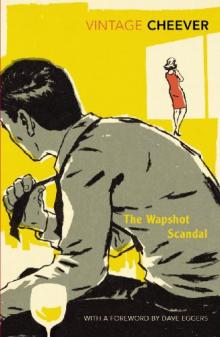 The Wapshot Scandal
The Wapshot Scandal The Stories of John Cheever
The Stories of John Cheever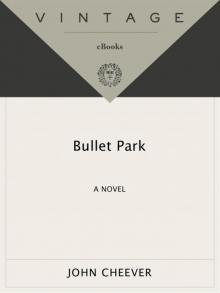 Bullet Park
Bullet Park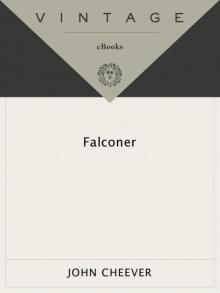 Falconer
Falconer The Journals of John Cheever
The Journals of John Cheever Oh What a Paradise It Seems
Oh What a Paradise It Seems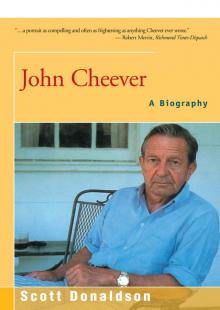 Scott Donaldson
Scott Donaldson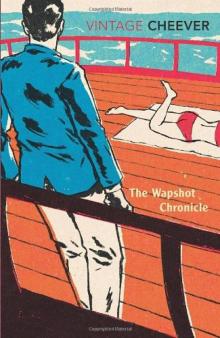 The Wapshot Chronicle
The Wapshot Chronicle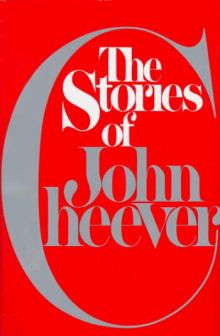 The Stories of John Cheever (1979 Pulitzer Prize)
The Stories of John Cheever (1979 Pulitzer Prize)